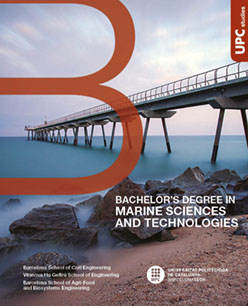Bachelor's degree in Marine Sciences and Technologies
Barcelona School of Civil Engineering (ETSECCPB)
Barcelona School of Agri-Food and Biosystems Engineering (EEABB)
Vilanova i la Geltrú School of Engineering (EPSEVG)
This bachelor's degree is designed to build the scientific and technical professional skills needed to carry out research and provide advice on environmental and climate topics and on the impact of economic and social activities on the marine environment and coasts (ethical, responsible and sustainable use of marine resources, characterisation of coasts, climate change and its impact on the marine environment and coasts, etc.). It is also designed for the education of other scientists and specialists and of society in general on activities related to basic and applied marine sciences and technologies, their development and their dissemination.
You can choose one of two majors:
Marine Sciences and Engineering
You will receive multidisciplinary training that will enable you to deal with the main problems and challenges faced by coasts in the near future in a range of development and climate change scenarios.
Marine Technologies
This major focuses on applied technologies for observation, remote sensing and exploration using marine robots, which are essential for monitoring coastal bodies of water and obtaining the data needed to control human activities in the marine environment involving the exploitation of marine and coastal resources.
You can choose one of two majors:
Marine Sciences and Engineering
You will receive multidisciplinary training that will enable you to deal with the main problems and challenges faced by coasts in the near future in a range of development and climate change scenarios.
Marine Technologies
This major focuses on applied technologies for observation, remote sensing and exploration using marine robots, which are essential for monitoring coastal bodies of water and obtaining the data needed to control human activities in the marine environment involving the exploitation of marine and coastal resources.
Majors
- Marine Sciences and Engineering
- Marine Technologies
- Professional opportunities
- Once you graduate, you are likely to find employment in the following areas:
- Integrated management of coastal areas (marine and coastal resources).
- Maritime and coastal management in the public administration.
- Consulting on marine and coastal topics.
- Ports.
- Development of devices, sensors and infrastructure for measuring and monitoring the sea.
- Planning and optimisation of social and economic activities (and their impact) involving seas and coasts.
- Maritime service companies and their adaptation to environmental regulations.
- Environmental impact studies in marine environments and studies on marine pollution, the maintenance of the quality of seawater, and climate change and its effects on seas and coasts.
- Renewable marine energies.
- Aquaculture.
- Offshore oil and gas platforms.
- Fishing and extraction of other marine resources.
- Desalinisation of seawater to produce drinking water.
- Teaching and research.




